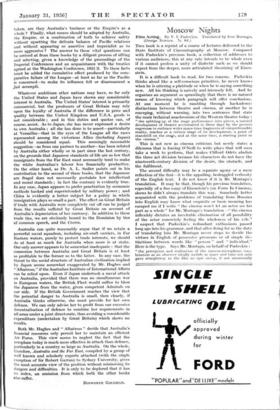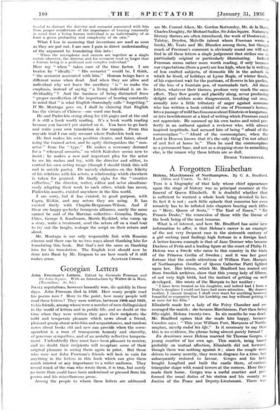Moscow Nights
Film Acting. By V. I. Pudovkin. Translated by Ivor Montagu. (George Nownes. is. 6d.)
THIS book is a reprint of a course of lectures delivered to the State Institute of Cinematography- at Moscow. Compared with Pudovkin's previous book, a collection of addresses to various audiences, this at any rate intends to be whole even if it cannot profess a unity of dialectic such as we should expect from the deeper, more articulated theorising of Eisen- stein.
It is a difficult book to read, for two reasons. Pudovkia thinks aloud like a self-conscious primitive, he never knows when he is uttering a platitude or when he is saying something new.. All his thinking is naively and intensely felt. And he organises an argument so sprawlingly that there is no natural means of knowing which paragraph will offer conclusions. At one moment he is rambling through hackademie distinctions between theatre and cinema, at another he is emerging, without warning, into two sentences that state the main technical anachronism of the Western theatre today : " the splitting-up of the stage performance into pieces, a natural development of theatre accentuated in these days by the present eagerness to embrace wider-space-time fragments of comprehensible reality, reaches at a certain stage of its development, a point of standstill on the stage, and at the same time, a starting point in the cinema."
This is not new as cinema criticism but newly states a dilemma that is forcing O'Neill to write plays that will soon take a week to perform, that makes Clifford Odets abolish the three act division because his characters do not have the nineteenth-century division of the desire, the obstacle, and the fulfilment.
The second difficulty may be a separate agony or a mere reflection of the first—it is the appalling, bedraggled verbosity of the English text. I do not know if it is Mr. Montagu's translation. It may be that, though his previous translation, especially of a fine essay of Eisenstein's (on Form In Cinema), shows he didn't always translate this way. Somebody better acquainted with the problems of translating from Russian into English may know what exquisite or basic meaning has escaped me if I write " the cinema won't let an actor sec his part as a whole" for Mr. Montagu's translation—" the cinema inflexibly dictates an inevitable elimination of all possibility of the actor concretely feeling the wholeness of his ride." I suspect that Pudovkin's redundant enthusiasm passed long ago into his grammar, and that after doing for us the duty of translating him Mr. Montagu never stops to decide the virtues in English of possessive pronouns or of simple dis- tinctions between words like " person " and " individual." Here is the type. Says Mr. Montagu, on behalf of Pudovkin : " the perception and realisation of the camera-microphone com- bination as an observer ideally mobile in space and timo not only gave straightway to the film an epic sweep, it not unnaturally
tended to distract the director and scenarist associated with him . from proper recollection of the importance of bearing constantly in mind that a living human individual is an individuality of at least a given profundity and complexity of its own."
What I lose in assuming that inventions are used as soon as they are put out, I am sure I gain in direct understanding of the argument by translating this into :
" When the microphone and camera are together as a single mobile observer, the director and his scenarist tend to forget that a human being is a profound and complex individual."
Here my " when " takes care of the time factor. I am beaten by " ideally." " His scenarist " would be, I think, '" the scenarist associated with him." Human beings have a different name when dead. And when they are alive and individual why not leave the auxiliary " is " to make the emphasis, instead of saying " a living individual is an in- dividuality " ? And the business of being distracted from " proper recollection of the importance of bearing constantly in mind that " is what English charmingly calls " forgetting."
If Mr. Montagu goes on, I shall be claiming that English has the virtues of Chinese—one word one book.
He and Pudovkin string along for 153 pages and at the end it is still a book worth reading. It's a book worth reading because you haven't yet started on it. You have to go back and write your own translation in the margin. From this wayside trail I can only recount where Pudovkin took me.
He first makes his own position clearer, and fairer, about using the trained actor, and he aptly distinguishes the " non- actor " from the " type." He makes a necessary demand for a " rehearsal scenario," on which Kuleshov seems now to insist ; he makes a new and important plea for the actor to see his rushes and try, with the director and editor, to control his own acting image (though I should think this will end in suicide pacts). He naively elaborates on the felicity of his relations with his actors, a relationship which elsewhere ' is taken for granted. He finally sighs for the " creative collective," the director, writer, editor and actor simultane- ously adapting their work to each other, which has never, Pudovkin asserts, existed anywhere in the film world.
I am sorry, but it has existed, to good purpose, with Capra, Riskin, and any actors they are using. It has existed finely with Chaplin-Bergmann-Wilson. And if these are happy-go-lucky bourgeois alliances, surely the same cannot be said of the Marxian collective—Groucho, Harpo,
. Chico, George S. Kaufmann, Morrie Ryskind, who vamp up . a story, write a treatment, send the actors off on a road tow to try out the laughs, reshape the script on their return and shoot.
Mr. Montagu is our only responsible link with Russian . cinema and there can be no two ways about thanking him for
translating this book. But that's not the same as thanking -him for his translation. The English text should now be
done into Basic by Mr. Empson to see how much of it still











































 Previous page
Previous page